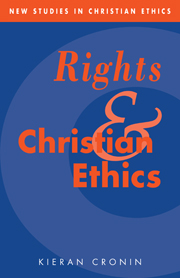Book contents
- Frontmatter
- Contents
- General editor's preface
- Preface
- 1 Metaethics: meaning and justification
- 2 Initial elucidation of rights-language
- 3 Conceptual scepticism and rights
- 4 Moral and theological scepticism
- 5 Imagination, metaethics and rights
- 6 Theological imagination and rights
- 7 Rights, power and covenant
- 8 Theological foundations of rights-language
- Epilogue
- Notes
- Index
1 - Metaethics: meaning and justification
Published online by Cambridge University Press: 29 September 2009
- Frontmatter
- Contents
- General editor's preface
- Preface
- 1 Metaethics: meaning and justification
- 2 Initial elucidation of rights-language
- 3 Conceptual scepticism and rights
- 4 Moral and theological scepticism
- 5 Imagination, metaethics and rights
- 6 Theological imagination and rights
- 7 Rights, power and covenant
- 8 Theological foundations of rights-language
- Epilogue
- Notes
- Index
Summary
The pages of this introductory chapter focus on two approaches to metaethics as these have bearings on our analysis of the language of rights. Roughly speaking the first half of the following discussion concentrates on one type of analysis, involving the problems of defining relatively technical moral and legal terms. I begin with some very basic ideas on definition, prescinding initially from the specific issues related to the analysis of moral language as such, and relate these ideas to rights-language in use every day. A move is then made to make some hesitant remarks on the evaluative, as opposed to the merely descriptive, meaning of the language of rights, stressing in particular the ways in which aspects of justification tend to be ‘built into’ our moral and legal vocabulary. The second half of my discussion derives its importance partly from the limitations experienced in trying to reduce the analysis of rights to definition alone. In other words, I begin to recognise explicitly the disadvantages of depending solely on a discursive metaethics. I attempt to complement the discursive approach with a more imaginative metaethical analysis. Where imagination has been advocated in the study of normative ethics, an attempt is made here to use the same valuable tool in the analysis of ethical concepts, such as rights and duties.
In his discussion of metaethics, William Frankena claims that the subject treats of four major questions:
What is the meaning or definition of ethical terms or concepts like ‘right’, ‘wrong’, ‘good’, ‘bad’? What is the nature, meaning or function of judgements in which these and similar terms or concepts occur? What are the rules for the use of such terms and sentences?
[…]
- Type
- Chapter
- Information
- Rights and Christian Ethics , pp. 1 - 25Publisher: Cambridge University PressPrint publication year: 1993



